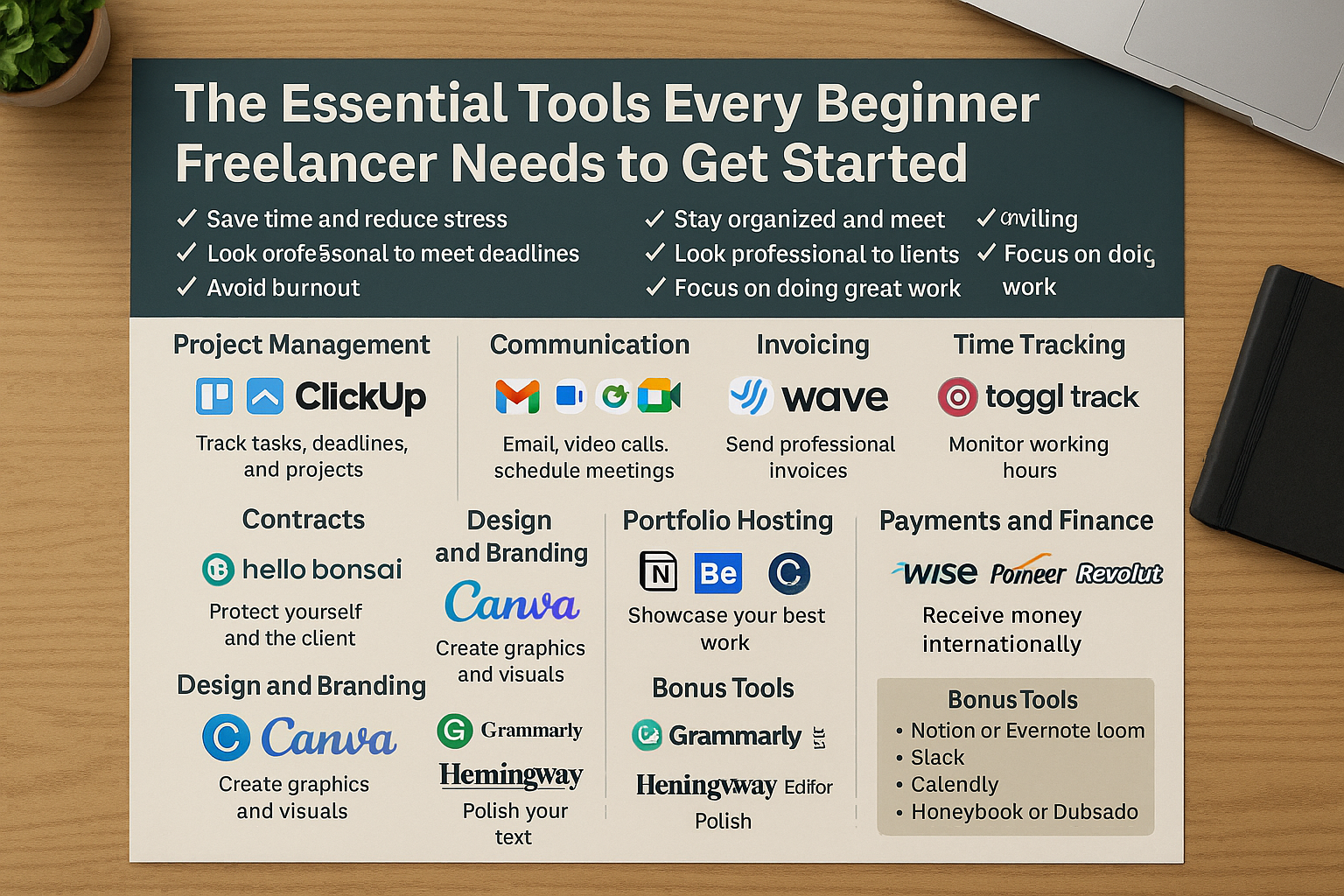Starting a freelance career is exciting—but without the right tools, it can quickly become overwhelming. From managing clients to staying organized and delivering high-quality work, the right systems will help you stay productive, professional, and stress-free. In this article, we’ll explore the essential tools every beginner freelancer needs to launch and grow a successful business.
Why Tools Matter in Freelancing
Freelancers wear many hats: marketer, service provider, project manager, accountant, and more. The right tools help you:
✅ Save time and reduce stress
✅ Stay organized and meet deadlines
✅ Look professional to clients
✅ Avoid burnout
✅ Focus on doing great work
Best of all? Many essential tools are free or have low-cost plans—perfect for beginners.
1. Project Management: Trello or ClickUp
These tools help you stay on top of tasks, deadlines, and priorities.
Trello:
- Card-based visual system
- Great for solo freelancers
- Drag-and-drop simplicity
ClickUp:
- More advanced features (like time tracking and goals)
- Better for freelancers juggling multiple projects
Use them to plan content, track client work, or organize your entire business.
2. Communication: Gmail + Google Meet or Zoom
Clear communication builds trust. Use:
- Gmail for professional emails
- Zoom or Google Meet for video calls
- Calendly to schedule meetings without back-and-forth
Pro tip: Create a dedicated freelance email (e.g., yourname@domain.com) to look more professional.
3. File Sharing: Google Drive or Dropbox
You’ll need a reliable place to store and share your work.
- Google Drive: Best for real-time collaboration (Docs, Sheets, Slides)
- Dropbox: Ideal for file syncing and storing large files
Organize folders by client or project to stay neat and efficient.
4. Invoicing: Wave or PayPal
Getting paid should be easy and professional.
Wave:
- Free accounting and invoicing software
- Create branded invoices
- Track payments and send reminders
PayPal:
- Easy for global clients
- Built-in invoicing
- Trusted by most clients
Set payment terms and always invoice promptly.
5. Time Tracking: Toggl Track
Especially useful if you charge by the hour or want to improve productivity.
- One-click timer
- Detailed reports on time spent per project or client
- Helps identify time-wasting habits
Even if you charge per project, it’s useful for pricing future work accurately.
6. Contracts: Hello Bonsai or AND.CO
A contract protects you and the client—and sets expectations.
- Bonsai and AND.CO provide ready-to-use templates
- Include scope, timeline, revisions, payment, and cancellation terms
- Collect e-signatures easily
Professional contracts = fewer misunderstandings = happier clients.
7. Design and Branding: Canva
Whether you’re creating social media content or proposals, Canva makes design easy.
- Free templates for portfolios, presentations, invoices
- Brand kits to keep your visuals consistent
- Great for non-designers
Canva Pro offers even more features, but the free version is perfect to start.
8. Portfolio Hosting: Notion, Behance, or Carrd
You need a place to show off your work.
Notion:
- Easy to customize and update
- Great for text-heavy portfolios (writers, VAs)
Behance:
- Ideal for designers, illustrators, and creatives
- Community exposure included
Carrd:
- Simple one-page websites
- Perfect for beginners with limited content
Start simple—then build as you grow.
9. Writing and Editing: Grammarly or Hemingway Editor
Clear writing = strong communication. Whether you’re a writer or not, these tools help polish your text.
- Grammarly: Checks spelling, grammar, tone, and clarity
- Hemingway: Highlights complex sentences and readability
Use them for proposals, emails, content, and client work.
10. Payments and Finance: Wise, Payoneer, or Revolut
If you work with international clients, these platforms help you receive money quickly and with low fees.
- Wise (formerly TransferWise): Excellent for global bank transfers
- Payoneer: Popular on freelance platforms
- Revolut: Banking for freelancers and travelers
Compare fees and options based on your location and client base.
Bonus Tools for Going Pro
- Notion or Evernote – For note-taking, journaling, and idea tracking
- Loom – Record quick videos for onboarding or project updates
- Slack – Client or team communication
- Calendly – Schedule meetings without email chaos
- Honeybook or Dubsado – Full client management suites (great for scaling)
Final Thoughts: Build a Freelance Toolkit That Works for You
You don’t need every tool from day one—but having a solid foundation makes freelancing easier, more professional, and more sustainable.
Start simple. Focus on tools that:
✅ Help you stay organized
✅ Make you look credible
✅ Save you time
✅ Improve your client experience
As you grow, your toolkit will grow with you. But even as a beginner, the right tools help you look like a pro from the start.

